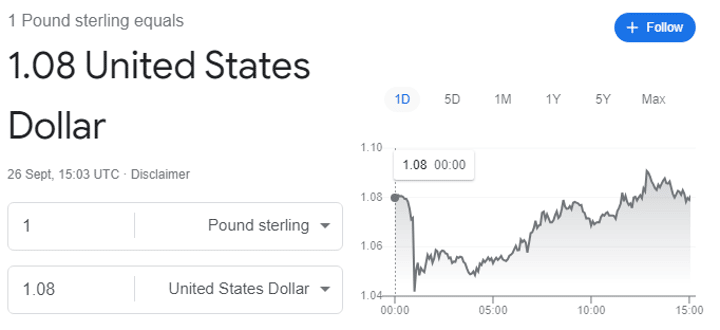Sudden political shifts, such as the start of the pandemic, Ukraine war, and potential sterling crisis, can tempt investors to try their hand at trading. Tread lightly.
The world has changed since the humdrum days of 2019. While investing over the long term for predictable returns remains the best way to reliably grow wealth, flash crashes in response to political events have sparked the return of trading; short-term buying and selling to generate a profit in as little as a few hours.
And it’s not hard to see why. The covid-19 pandemic crash sparked a market sell-off that saw most major indices, including the FTSE 100 and S&P 500, lose a third of their value in the space of a month in early 2020.
And just as pandemic recovery seemed imminent, supply chains and inflation were once again squeezed by Russia’s invasion of Ukraine. This sent the price of oil, natural gas, and a half dozen critical commodities to record, or near-record, highs.
With inflation roaring into double-digit territory, it’s understandable that investors will be looking for further gains. Individual tech shares like Netflix, Meta, or Peloton, have seen record one-day share price falls in 2022, cementing the idea that quick profits can be found through trading in a recession.
Where next for political trading?
Looking to the future, seismic political shifts may await. In the UK, diverging monetary and fiscal policy saw sterling plunge to a record low of $1.04 today, before recovering. Many investors speculate the Bank of England will intervene with emergency interest rate rises that could crash the housing market.
A fall to parity could well see newly-minted PM Liz Truss face a vote of no confidence, with a general election to follow soon after.
In China, speculation swirls that long-term President Xi Jinping, hoping for an unprecedented third term as leader of the Chinese Communist Party, is under house arrest, and will be imminently replaced, with implications for Taiwan and the wider world.
Switching to Ukraine, numerous sources report that Russian President Vladimir Putin has fled to a ‘secret palace’ as widespread outrage grows over his ‘partial mobilisation’ that is forcing Russians to confront the possibility that the war many have largely supported may soon be coming to the end of their own rifles.
Further, Ukraine’s incredible territory gains, and Russia’s demonstration of military weakness, have seen both India and China call for peace. Putin has recognised Chinese ‘concerns’ over the invasion, while Indian foreign minister Subrahmanyam Jaishankar says only that ‘India is on the side of peace and will remain firmly there.’
Russian regime change is not impossible; few saw the collapse of the Soviet Union coming.
In Italy, the far-right Brothers of Italy party leader, Giorgia Meloni, is poised to become Prime Minister after close-fought elections, with a majority expected in both houses of parliament. Her nationalist protectionist overtones are already worrying Brussels, especially in the aftermath of Brexit, and with potential Euro and gas shortage crises soon to hits the continent.
Concerningly, her first two congratulatory messages came from Poland and Hungary, who also have governments who dislike the EU, due to complaints of political overreach and LGBT rights.
This could become a problem, as the European Central Bank will need to raise interest rates in line with the Federal Reserve and Bank of England. Italy has a GDP-to-debt ratio of 134.8%, and may not be able to afford these higher rates, setting the stage for a political clash just as tensions over the response to the Ukraine war escalates.
And in November, US President Jo Biden faces mid-terms. While most sitting Presidents expect to lose seats in mid-terms, he could be severely punished for poor economic performance regardless of his control over it. However, student loan forgiveness and the repeal of Roe v Wade makes the political outcome far from certain.
And this uncertainty can create opportunities.
Political trading: investing strategies to consider
Given the likely rapid political shifts, it can be very tempting to attempt to profit off the accompanying volatility.
However, this should come with a few caveats.
First, nothing beats long-term investing for reliable returns. Novices who engage in short-term trading strategies often simply lose capital. You are trading on imperfect information, and when news hits the front pages, it is usually too late to capitalise.
In this vein, only trade what you are prepared to lose.
Second, trading the markets requires far more time and attention than investing. For example, GBP/USD fell from $1.09 to $1.04 and then recovered to $1.09 within the space of a few hours on Monday.

Third, most traders use stop losses to prevent losing all their capital. Learn what these are.
Finally, much political risk is already priced into the markets. While rapid changes can create volatility, markets return to the status quo more often than not.
Yes, getting your fingers burnt is part of the experience. And of course, the lucky and the skilled few can make exceptional returns in short time frames.
But remember, they are the minority.
This article has been prepared for information purposes only by Charles Archer. It does not constitute advice, and no party accepts any liability for either accuracy or for investing decisions made using the information provided.
Further, it is not intended for distribution to, or use by, any person in any country or jurisdiction where such distribution or use would be contrary to local law or regulation.
